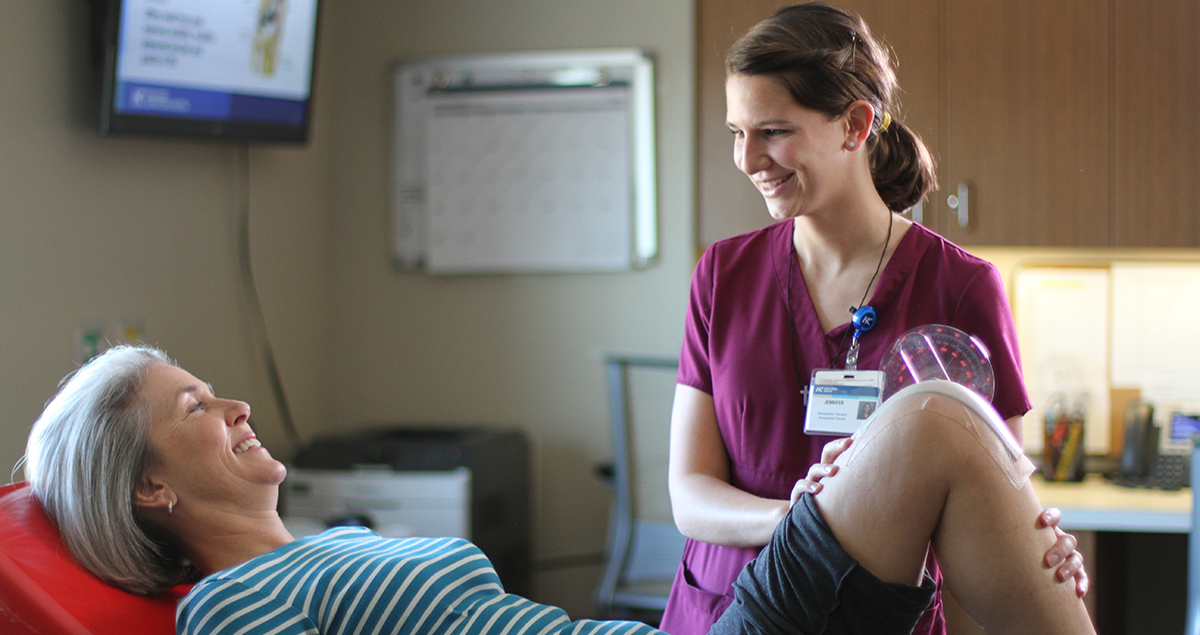Joint Replacement Answers to Your Frequently Asked Questions
December 3, 2018
Categories: Health Conditions, Joint Services
When should I consider a joint replacement?
You should consider surgery for your arthritic joints when other treatments aren’t working and your pain is significantly impacting your daily activities. Doctors typically recommend over-the-counter anti-inflammatory medications first, and then move on to prescribing medications. The next line of treatment is steroid/cortisone injections. Viscous gel injections may be an option for knee osteoarthritis. When those options stop working for you, surgery is usually called for.
How do I prepare for the surgery?
At Holy Cross Hospital or Holy Cross Germantown Hospital, patients who are scheduled for joint replacement surgery take a pre-operative class to learn what to expect before, during and after the surgery. You should also prepare your home for the recovery period by moving furniture out of the way and making arrangements to stay on the first floor if you have stairs.
How long does the procedure last?
A joint replacement surgery typically takes 2 to 3 hours.
Does it hurt?
General and regional (epidural and/or spinal) anesthesia are typically used during joint replacement surgery, so won’t feel anything during the procedure. Local Injections and/or nerve blocks are also used to reduce pain post-operatively. After surgery, effective pain management helps to prevent complications, keep your immune system working well, and allow you to fully participate in therapy. Following surgery, you’ll probably feel pain for the first few days. Your doctor will order a combination of oral and intravenous medications to help control your pain and keep you as comfortable as possible.
How long will I be in the hospital?
Expect to stay in the hospital one to two days following your surgery. The exact amount of time you stay in the hospital will depend on how quickly you recover. Your doctor will want to make sure that your pain is under control and that you’re able to walk and climb a few stairs before discharging you to go home.
How long is the recovery time?
Recovery happens gradually, and the actual time will vary depending on the type of surgery you have and your physical condition. Physical therapy and walking, which begins while you are still in the hospital, can speed your recovery time, so be sure to follow the advice of your doctor. You should be able to resume most of your normal daily activities around six weeks after surgery. It may take up to three months for pain and swelling to settle down. You can expect a full recovery within six months to a year following your surgery.
What activities should I avoid after surgery?
Joint replacement surgery should enable you to resume your normal activities without the pain you experienced before. But there are a few things you should avoid doing that place excessive stress on your new joints, such as participating in high-impact sports like racquetball and skiing. Once your doctor gives you the go-ahead, you’ll be able to enjoy low-impact activities like walking, swimming, golfing and bicycling. You won’t be able to drive while you’re taking narcotic pain medication. But once you’ve stopped taking pain medications and your strength and reflexes have returned, you’ll be able to drive again. Talk to your doctor about when it’s safe to resume driving.
What are the risks?
Advances in technology and medical care have made joint replacements safe and effective, but there are risks inherent in any major surgery. You should talk to your surgeon about the risks and how they can be mitigated.
How do I prevent infection?
During your recovery time at home, you’ll need to follow your hospital’s instruction for wound care to help prevent infection. In general, you’ll need to keep the wound area clean and dry and change the bandage per the instructions you’re given. Notify your doctor immediately if you experience any of these symptoms: persistent fever, shaking chills, increased redness or swelling of your wound, drainage of your wound. These could be signs of infection.
What if I have more questions?
Attend a free Joint Replacement Preoperative Class at Holy Cross Hospital or Holy Cross Germantown Hospital to meet caregivers; see our facility; and learn what to expect before, during and after surgery.
Holy Cross Health presents the information in this blog as a resource for our community. It is not intended to replace professional medical advice or to endorse any particular entity or service. Personal health problems should be brought to the attention of the appropriate health professionals.
